J.R. Carpenter's Blog, page 7
March 19, 2012
800 characters on Monfort & Strickland's The Sea and Spar Between
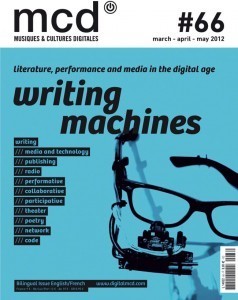 This beautiful bilingual issue #66 of the French Magazine MCD (musiques & cultures digitales) is dedicated to Writing Machines: literature, performance and media in the digital age. It was edited by Emmanuel Guez and contains articles by and/or about Annie Abrahams, Serge Bouchardon, Philippe Bootz, Laura Borràs, Peter Ciccariello, Katherine Hayles, Jorg Piringer, Alexandra Saemmer, Brian Stefans, and many many more.
This beautiful bilingual issue #66 of the French Magazine MCD (musiques & cultures digitales) is dedicated to Writing Machines: literature, performance and media in the digital age. It was edited by Emmanuel Guez and contains articles by and/or about Annie Abrahams, Serge Bouchardon, Philippe Bootz, Laura Borràs, Peter Ciccariello, Katherine Hayles, Jorg Piringer, Alexandra Saemmer, Brian Stefans, and many many more.
Somewhere in there is a teeny tiny text I wrote about The Sea and Spar Between by Nick Montfort and Stephanie Strickland. Adhering to Guez's strict stipulation that the text be no longer that 800 characters – including spaces – was quite a challenge. The Sea and Spar Between is a poetry generator which defines a space of language populated by a number of stanzas comparable to the number of fish in the sea, around 225 trillion. That in the world there now exists a French translation of an 800 character text that I wrote about a generator Montfort and Strickland made using words from Emily Dickinson's poems and Herman Melville's Moby Dick confounds and delight's me.
"en avant! / car la mer est sans repos"
"dash on / for pauseless is the sea"
It is possible to buy a PDF copy of MCD #66 Machines d'écriture / Writing machines online, but buy the paper copy. It's is really very nice.
Tweet
CAPTA: Conversations with poets about technology
Freaky genius digital poet David Jhave Johnston has been roving around North America engaging practitioners and theorists of digital literature in conversation and uploading the unedited videographic data captured in these sessions to his site: CAPTA: Conversations with poets about technology.
The first conversation in the series is with John Cayley, who reads and discusses his poem PENTAMETERS TOWARD THE DISSOLUTION OF CERTAIN VECTORALIST RELATIONS (which examines the effect of Google on language and poetics) with discursive and conversational interrupts from Jhave. That is a pretty hard act to follow. But that's okay, because the second CAPTA conversation is with Chris Funkhouser, author of two books on digital poetry: Prehistoric Digital Poetry & New Directions in Digital Poetry. He can hold his own. Pity the poor poet who has to follow those two. Because, alas, it's me.
Jhave is a lively interlocutor and a lovely human being. The conversation we had was a pleasure in its unfolding, so I'm not too embarrassed to share it with you here.
CAPA #3: J. R. Carpenter
JR Carpenter from David (Jhave) Johnston on Vimeo.
Recorded at the Banff Centre on Feb. 21st 2012.
To view these three conversations, and to sign up for email notifications announcing future conversations with Steve McCaffery, Loss Pequeño Glazier, Christian Bök, Ian Hatcher, D. Kimm, Charles Bernstein, Andrew Klobucar, Fred Wah and Jhave, visit: http://glia.ca/2012/capta/
Tweet
800 characters on Monfort & Strickland’s The Sea and Spar Between
 This beautiful bilingual issue #66 of the French Magazine MCD (musiques & cultures digitales) is dedicated to Writing Machines: literature, performance and media in the digital age. It was edited by Emmanuel Guez and contains articles by and/or about Annie Abrahams, Serge Bouchardon, Philippe Bootz, Laura Borràs, Peter Ciccariello, Katherine Hayles, Jorg Piringer, Alexandra Saemmer, Brian Stefans, and many many more.
This beautiful bilingual issue #66 of the French Magazine MCD (musiques & cultures digitales) is dedicated to Writing Machines: literature, performance and media in the digital age. It was edited by Emmanuel Guez and contains articles by and/or about Annie Abrahams, Serge Bouchardon, Philippe Bootz, Laura Borràs, Peter Ciccariello, Katherine Hayles, Jorg Piringer, Alexandra Saemmer, Brian Stefans, and many many more.
Somewhere in there is a teeny tiny text I wrote about The Sea and Spar Between by Nick Montfort and Stephanie Strickland. Adhering to Guez’s strict stipulation that the text be no longer that 800 characters – including spaces – was quite a challenge. The Sea and Spar Between is a poetry generator which defines a space of language populated by a number of stanzas comparable to the number of fish in the sea, around 225 trillion. That in the world there now exists a French translation of an 800 character text that I wrote about a generator Montfort and Strickland made using words from Emily Dickinson’s poems and Herman Melville’s Moby Dick confounds and delight’s me.
“en avant! / car la mer est sans repos”
“dash on / for pauseless is the sea”
It is possible to buy a PDF copy of MCD #66 Machines d’écriture / Writing machines online, but buy the paper copy. It’s is really very nice.
Tweet
January 27, 2012
STRUTS added to Authoring Software
An account of the making of STRUTS, a recent work of digital literature commissioned for SFMoMA, has been added to Judy Malloy's fantastic online new media writing resource, Authoring Software.
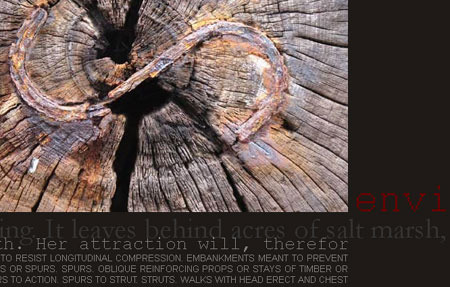
Pictured above: screenshot detail from STRUTS, a a rhythmic algorithmic computationally composed text collage created from a collection of fragments of facts and fictions pertaining to the Tantramar region of New Brunswick. (Canada) Read about the making of STRUTS on Authoring Software.
Begun in conjunction with the 2008 Electronic Literature Organization Conference, which took place in Vancouver, Washington, Authoring Software has become, in Malloy's words:
A resource for teachers and students of new media writing, who are exploring what authoring tools to use, for new media writers and poets, who are interested in how their colleagues approach their work, and for readers, who want to understand how new media writers and poets create their work, the Authoring Software project is an ongoing collection of statements about authoring tools and software. It also looks at the relationship between interface and content in new media writing and at how the innovative use of authoring tools and the creation of new authoring tools have expanded digital writing/hypertext writing/net narrative practice in this vibrant contemporary creative writing field.
Judy Malloy is a pioneering new media poet, editor and arts writer. She began working toward hypertextual narrative in the 1970′s, creating experimental artist books in card catalogue and electro-mechanical structures. In 1986 she wrote and programmed the germinal hyperfiction Uncle Roger. She has been working in the field of computer-mediated literature for 25 years. In that time she has seen many authoring softwares come and go.
More information about Judy Malloy may be found on Authoring Software and on her website.
More information about Authoring Software
My contributions to Authoring Software: STRUTS, Excerpts From the Chronicles of Pookie & JR, and Entre Ville
Tweet
January 12, 2012
Fight for the right to use the internet in poetic and intransigent ways #SOPA #BlackoutSOPA #J18
I got my first Unix account in 1993. I didn't know much about computers, but the adoption of a system which I perceived to be born our long-standing collective desire and seemingly perpetually vainglorious attempts to communicate across long distances through the elusive and transitory medium of the written word didn't seem like such a leap of faith. The Internet has developed an interface since then, a painted face to hide all manner of ignorance and nefarious activity behind. In the countless artist statements, grant applications, articles and blog posts I've written over the course of my nineteen years, I've included some version of this sentence:
The more proprietary, predatory, and puerile a place the internet becomes the committed I am to using it in poetic and intransigent ways.
This commitment compels me to urge you to join #BlackoutSOPA #J18 18 January 2012. Shut down your blogs, web pages, facebook pages and profiles and twitter accounts for 12 hrs from 8am-8pm EST and show a message opposing #SOPA and #PIPA. In the amazing amount of spare time you will suddenly have on your hands, consider a #Paperstorm during the #SOPAblackout. Go out on the streets and pass flyers to inform people that the US congress is seriously and wilfully ignorantly considering legislation that will dramatically change the Internet as we know it, putting an end to many sites we use everyday. Including this one. This blog, Lapsus Lingue, runs on WordPress. In 10 January 2012 blog post WordPress urged its 60 million users to Help Stop SOPA/PIPA. Internet experts, organizations, companies, entrepreneurs, legal experts, journalists, and individuals the world over have repeatedly expressed how dangerous this bill is.
If we — the denizens of this tangled web of our own making; the collective authors of this never-ending networked narrative; the cartographers of this map of our twisting turning yearning desire for connection, for community, for communion; the caretakers of these web sites, these stand-ins for past and future places, these repositories for our long-standing longing for belonging, for home — if we do nothing, Congress will likely pass the Protect IP Act (in the Senate) or the Stop Online Piracy Act (in the House), and then the President will probably sign it into law. Even if we do something, they might. Which does not dissuade but rather further propels me to fight for the right to use the internet by using it in poetic and intransigent ways.
For more information on #BlackoutSOPA #J18 see the 10 January 2012 reddit blog post Stopped they must be; on this all depends.
Tweet
December 31, 2011
Reading List 2011
Since 1996 I've been noting the author and title of each book I've read in a red book a little larger than A5 size, worn at the spine now, but with plenty of pages left as there were plenty of pages to begin with. Since 2005 I've been duplicating those entries here on Lapsus Linguae. Whether in book or digital form, the resulting document cannot properly be called a reading list. I've only ever listed books read, and only those read cover to cover. In the beginning this made sense because I mostly only read books and lots of them and almost all of them from cover to cover. I still read lots of books, but finish fewer of them.
So much of what I'm reading these days is research-related, parsed for the parts I need, those parts then heavily annotated, read and re-read. I read more online now that I used to, but not books – articles. I also spend a lot more time in libraries than I used to, but rarely for book-related reasons. Most of my time at the Bodleian Library this year has been spent with the Marconi Archive, sifting through boxes of loose sheets of papers. Though I've read more than a book's worth of correspondence written in Marconi's atrocious handwriting, that reading is not reflected here. At the British Library, much time has been spent leaning over large tables in the Maps and Manuscripts reading rooms. Perhaps Joseph Frederick Wallet Des Barres, The Atlantic Neptune should appear on this list. It is a book, a massive book, three volumes worth. Though it contains charts rather than chapters, I've read every page. Same goes for John Dee's 1580 map of the world upon the back of which Dee outlines England's claim to the America's for Queen Elizabeth. It is only one page, or sheet of vellum rather, but it may be one of the most important documents in Canadian history. And then there are all the variations on Samuel de Champlain's maps of Nouvelle-France I've pored over, and the vintage guide books I've not followed, and the stacks of post cards…
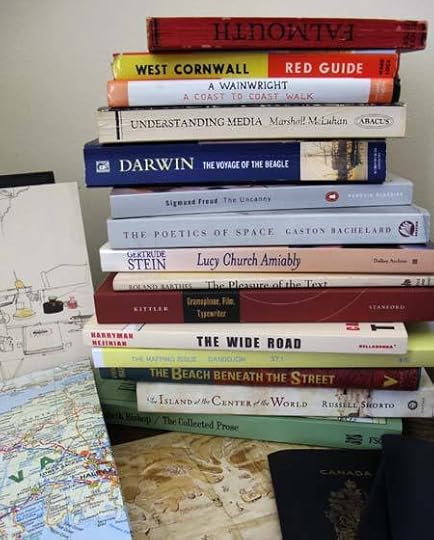
[ desk stack 09/09/2011 ]
Over the past two years this habitually kept list of authors and titles of books read has become less and less and less representative of what I'm actually reading. Which makes it all the more interesting in certain ways. Map-related books figure prominently, as to voyages and travelogues and books on walking. Media theory, of course. And network communications. A number of books listed here are re-reads. I got most of the way through A Hacker Manifesto years ago, but had to return it to the library eventually, with fines owing. Foucault makes way more sense to me now than in 1998, when I first attempted the same battered copy of The Order of Things I have with me here in England. The Rings of Saturn is even more haunting now after having walked in Suffolk myself. We've all read bits and pieces of The Travels of Sir John Mandeville – it's almost odd to read them together at last, all of a piece. Darwin is an elegant prose stylist, who knew? Why did it take me so long to stumble over Cha's brilliant Dictee? The year's reading began with the utterly original Riddley Walker and ended with its author Russell Hoban's passing. So many quirky odd-ball intriguing wandering wonderful books browsed, borrowed, bought and begun in between. Other still on the go. Those finished, listed below:
McKenzie Wark, A Hacker Manifesto
W. G. Sebald, The Rings of Saturn
Theresa Hak Kyung Cha, Dictee
Michel Foucault, The Order of Things
Mandeville, The Travels of Sir John Mandeville
Hakluyt, Voyages and Discoveries
Gillian Cookson, The Cable
Courtney Rowe, Marconi at The Lizard: The story of communication systems at Housel Bay
J. G. Ballard, Concrete Island
Iain Sinclair, Ghost Milk: Calling Time on the Grand Project
William Gibson, Zero History
Douglas Coupland, Marshall McLuhan: You Know Nothing of My Work!
Roberto Simanowski, Digital Art and Meaning: Reading Kinetic Poetry, Text Machines, Mapping Art, and Interactive Installations
Francesco Careri, Walkscapes: Walking as an Aesthetic Practice
Carla Harryman & Lyn Hejinian, The Wide Road
Gertrude Stein, Lucy Church Amiably
Karen Russell, Swamplandia
McKenzie Wark, The Beach Beneath the Street: The Everyday Life and Glorious Times of the Situationist International
Guy Debord, Comments on the Society of the Spectacle
Friedrich A. Kittler, Gramophone, Film, Typewriter
Marshal McLuhan, Understanding Media: The Extensions of Man
Robert C. O'Brien, Mrs Frisby and the Rats of NIMH
Lydia Davis, Cows
Adam Lebor, The Budapest Protocol
Russell Shorto, The Island at the Center of the World: The Epic Story of Dutch Manhattan and the Forgotten Colony that Shaped America
Charles Darwin, The Voyages of the Beagle
Lauren Beukes, Zoo City
Ben Marcus, The age of Wire And String
Steven Millhauser, In The Penny Arcade
Sandra Barry, Elizabeth Bishop: Nova Scotia's "Home-made" Poet
Brett C. Millier, Elizabeth Bishop: Life and the Memory of It
Jean-Jacques Lecercle, Deluze and Language
Maya Merrick, Sextant
H.D., end to torment
Andrea di Robilant, Venetian Navigators: The Voyages of the Zen Brothers to the Far North
Franco Moretti, Graphs, Maps, Trees: Abstract Models for Literary History
Rachel Hewitt, Map of a Nation: A Biography of the Ordnance Survey
Jeffrey Sconce, Haunted media: Electronic Presence from Telegraphy to Television
Joseph Conrad, Heart of Darkness
Judith Schalansky, Atlas of Remote Islands: Fifty Islands I Have Never Set Foot on and Never Will
Elisabeth Belliveau, Don't Get Lonely Don't Get Lost
Jonathan Safran Foer, Tree of Codes
Jay David Bolter, Writing Space: Computers, Hypertext and the Remediation of Print
Rita Raley, Tactical Media
Daniel Defoe, A Journal of the Plague Year
Russell Hoban, Riddley Walker
READING LIST 2010>>>
READING LIST 2009 >>>
READING LIST 2008 >>>
READING LIST 2007 >>>
READING LIST 2006 >>>
READING LIST 2005 >>>
Tweet
December 28, 2011
a list long as my arm of places travelled to this past year, arranged chronologically by name
This is a list of names of places travelled to this past year. Places which took more than half an hour to get to by car or by train, or more than an hour to walk to. Places in which a day was spent, or a night, or a meal. Places involving a strange bed, a map, a menu pondered over, a view contemplated, a waterfront walked along, a walk of any kind, a bookshop, a library, a companion, a conversation, a conference, a performance, a spot of shopping, or any combination there of. Places I remember.
This list does not include the names of airports or ferry terminals or motorway service stations or other such in between places. Nor does it include the names of all the places that travelled to me, via visitors, phone calls, postcards, packages, skype, the interweb, books and films. It doesn't bother with the countless trips into Dartington or Totnes to purchase provisions and no doubt forgets about a few of the impromptu excursions further afield to South Devon beaches, pubs, and dear friends' homes.
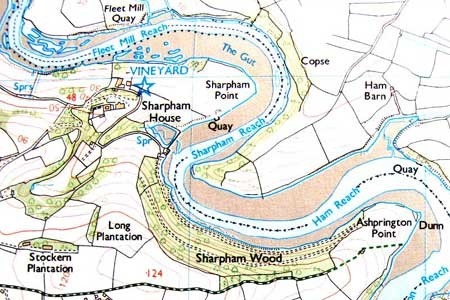
Though this list begins at home at Sharpham House, and ends at home at Sharpham House, with no other instances of Sharpham House listed, there were certainly stretches of home in between, spent doing pretty much what Elizabeth Bishop imagines herself doing in the "crypto-dream-house," she longs to walk as far as in The End of March. Which is to say, despite, or perhaps because of all the travel this past year, and though Sharpham is the antithesis of a "sort of artichoke of a house," there were also many days in which I did nothing but:
look through binoculars, read boring books,
old, long, long books, and write down useless notes,
talk to myself, and, foggy days,
watch the droplets slipping, heavy with light.
Sharpham House
Falmouth
Exeter
London
Naples
Pompeii
Rome
Montreal
Banff
Oxford
Falmouth
London
Bantham
Start Point
Penzance
Mousehole
Porthcurno
Sennen Cove
Bude
Banff
Montreal
Toronto
Buffalo
Sackville
Wolfville
Falmouth
Peggy's Cove
Halifax
Sackville
Halifax
Sackville
Falmouth
Lime Regis
Burgh Island
La Rochelle
Temple sur Lot
Cahors
Frontignan
Sète
Montpelier
Nîmes
Argentat
Saumur
Rennes
Bath
Ljubljana
London
Bristol
London
Paris
Falmouth
Bristol
Oxford
St. Ives
Mousehole
Lizard
Poldhu
Falmouth
St. Austell
Teignmouth
Bournemouth
Barcelona
Bath
Amsterdam
Dartmoor
Bath
Sharpham House
November 28, 2011
WANDERKAMMER: A Walk Through Texts
Wander (Wun¦der)
verb 1. [with adverbial of direction] walk or move in a leisurely or aimless way: I wandered through the narrow streets, [with object] travel aimlessly through or over (an area): he found her wandering the streets, (of a road or river) meander. 2. move slowly away from a fixed point or place: please don't wander off again. figurative his attention had wandered. 3. be unfaithful to one's regular sexual partner. noun an act or instance of wandering: she'd go on wanders like that in her nightgown.
Wanderkammer (Wun¦der|kam¦mer)
noun (plural Wanderkammern)1. a web-based collection of hyperlinked quotations from curious and rare writings on the topic of wandering. 2. a walk through texts.
WANDERKAMMER: A Walk Through Texts
hypertext an odd-ball semantic web project by J. R. Carpenter published in Jacket2, in Walk poems: A series of reviews of walking projects edited by Louis Bury and Corey Frost.
J.R. Carpenter
proper noun 1. author of writing on wandering. 2. wanderer through texts. 3. collector of curious and rare writing on wandering. 4. creator of Wanderkammern.
Jerome Fletcher
proper noun 1. Wanderkammer collaborator. 2. collector of curious and rare writing on wandering.
Additional quotations contributed by Mythogeography, Neil Thompson and Maddie Thompson.
Tweet
November 8, 2011
Faculty for In(ter)ventions: Literary Practice at the Edge residency program at The Banff Centre
I am very much looking forward to serving as the digital literature faculty member for the second In(ter)ventions: Literary Practice at the Edge residency program set to take place at The Banff Centre 13-15 February 2012. This ground-breaking residency fosters new writing practices, including digital literature, collaboration, new narrative, and performance. Participants work independently, with faculty and with each other to develop new or current work; meet, network, and learn from like-minded artist in a community of diverse practices and projects. Given the hybrid, collaborative, inter-, cross-, multi- nature of the In(ter)ventions program, faculty areas of specialization tend to overlap, criss-cross and contrast in all sorts of exciting and unexpected ways. This year we will be:
Program Director: Steven Ross Smith
Faculty: Fred Wah – New poetics, collaboration. J. R. Carpenter – Digital Literature, new narrative. Steve Tomasula – New formality, Multi-media.
Invited Speakers: Brian Kim Stefans – Transliteracy, Hybridity. D. Kimm – Performance, Cross-genre, Multi-disciplinarity
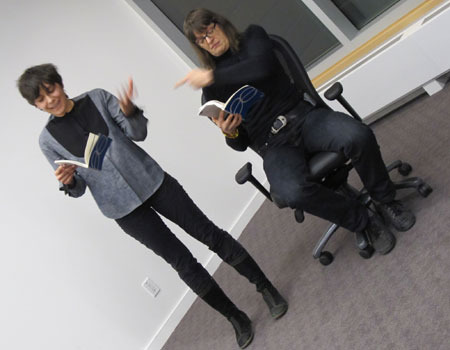
In(ter)ventions 2011 Invited Speakers included Debra Di Blasi, Daren Wershler, and the brilliant and really very funny Oana Avasilichioaei and Erin Moure, pictured above. The incredible diversity of the participants makes this program both thrilling and unique. Work produced by In(ter)ventions 2011 participants included (but was certainly not limited to): an inter-linked Mobius strip narrative, a Jello-letter alphabet, a criti-fiction quasi-biography in two columns, a sound art performance, a needlepoint embroidery, a video mashup, a powerpoint annimation by Erin Robinsong, pictured below, and a group chap book.
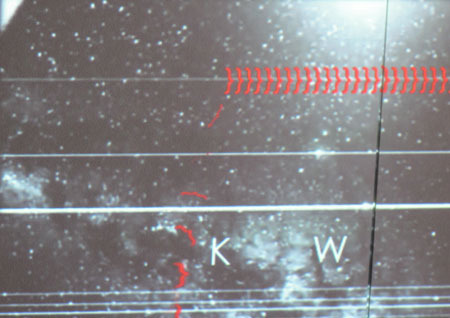
The application deadline for In(ter)ventions 2012 is: November 15, 2011
Activities during the residency include one-on-one sessions with individual faculty members to discuss your work, as well as group discussions, presentations, and performances. Group discussions explore issues with new practices and may include philosophical or critical thinking, aesthetic issues, demonstrations, technical issues, and more. Performances may occur in informal or formal settings, as The Banff Centre can offer everything from professionally-staffed theatre venues of various sizes, to small meeting rooms for informal presentations — all venues are fully technically-enabled. Recording facilities are also available.
Participants are housed in single rooms that also serve as their private work spaces. Writers should bring their own computers or laptops, as well as software, if they wish to use a computer on a full-time basis in their rooms. A PC and a Macintosh computer are available for general email and printing purposes. Photocopying services are available at several public locations, free wireless internet access is available throughout the campus, and a staggering range of books, artist's book, videos, sound recordings and other rare and wonderful archival materials are available at The Banff Centre library, aka the Paul D. Fleck Library & Archives.
The In(ter)ventions program is designed for writers (both published and yet-to-be published) and performers with an interest in exploring the expanding frontiers of the writing practice. If you are seeking a opportunity to interact with peers and leading creators in the fields of digital and collaborative literature and new writing, while having dedicated time to develop a specific project, this residency is for you. Applications from writers/artists with experience in the field, as well as those interested in exploring literary practice at the edge for the first time are welcomed to apply by November 15, 2011
For more information about the program, including information about facilities, faculty bios, program fees and online application forms, please visit: In(ter)ventions: Literary Practice at the Edge
Tweet
September 19, 2011
STRUTS – new digital literature commissioned by SFMoMA
STRUTS is a new work of digital literature commissioned for the San Francisco Museum of Modern Art. This commission is the latest in a series of new works featured on SFMoMA's Open Space blog, in an excellent column on digital literature by Brian Stefans called: Third Hand Plays. Since the start of the series in July 2011, works have been commissioned from Daniel C. Howe, Alan Bigelow, joerg piringer, Alison Clifford, Erik Loyer, Benjamin Moreno Ortiz, Jhave, Christine Wilks and Jason Nelson. Forthcoming are new works from David Clark and Brian Stefans. I'm thrilled to keep such fantastic company. STRUTS launched on September 15, 2011. Posts to Third Hand Plays will wrap up at the end of September but I suspect the column with enjoy a long afterlife as an accessible, resource-full and fully engaged set of commentaries, concepts and links and resources of interest to digital literature practitioners and newcomers alike.

STRUTS is an algorithmic collage created from a collection of fragments of facts and fictions pertaining to a place and its people, history, geography and storm events. Narrative resonates in the spaces between the texts horizontally scrolling across the screen, the flickering updating of monthly tide gauge averages, the occasional appearance of live weather weather warnings pulled in by RSS feed and the animated set of photographs of the ends of the struts that support the seawall that protects the foreshore in front of Linda Rae Dornan's cottage from the rising tides of the Northumberland Strait. The photographs were taken on May 23, 2011 the second day of a five-week stint as Open Studio Artist in Residence at Struts Gallery and Faucet Media Lab, Sackville, New Brunswick, Canada, May 22 – June 26, 2011.
STRUTS. STRUCTURAL MEMBERS, AS IN TRUSSES, PRIMARILY INTENDED TO RESIST LONGITUDINAL COMPRESSION. EMBANKMENTS MEANT TO PREVENT EROSION OF SHORELINES. BRACE OR SUPPORT BY MEANS OF STRUTS OR SPURS. SPURS. OBLIQUE REINFORCING PROPS OR STAYS OF TIMBER OR MASONRY. ON THE SPUR OF THE MOMENT. ON IMPULSE. SPURS TO ACTION. STRUTS. WALKS WITH HEAD ERECT AND CHEST THROWN OUT, AS IF EXPECTING TO IMPRESS OBSERVERS. WITH PROUD BEARING. PARADES, FLOURISHES. STRUTS AND SWAGGERS. STRUTS GALLERY. SUPPORTS BY MEANS OF STRUTS. STRUCTURAL MEMBERS SPUR STRUTS TO ART ACTION. WALKS WITH HEAD ERECT ALONG LONGITUDINAL EMBANKMENTS. SEAWALLS BRACED BY SPURS. STAYS. PREVENT EROSION. OF MOMENTS. OBLIQUELY.
[an excerpt from STRUTS, by J. R. Carpenter, commissioned for SFMoMA, launched September 15, 2011.]
Tweet



